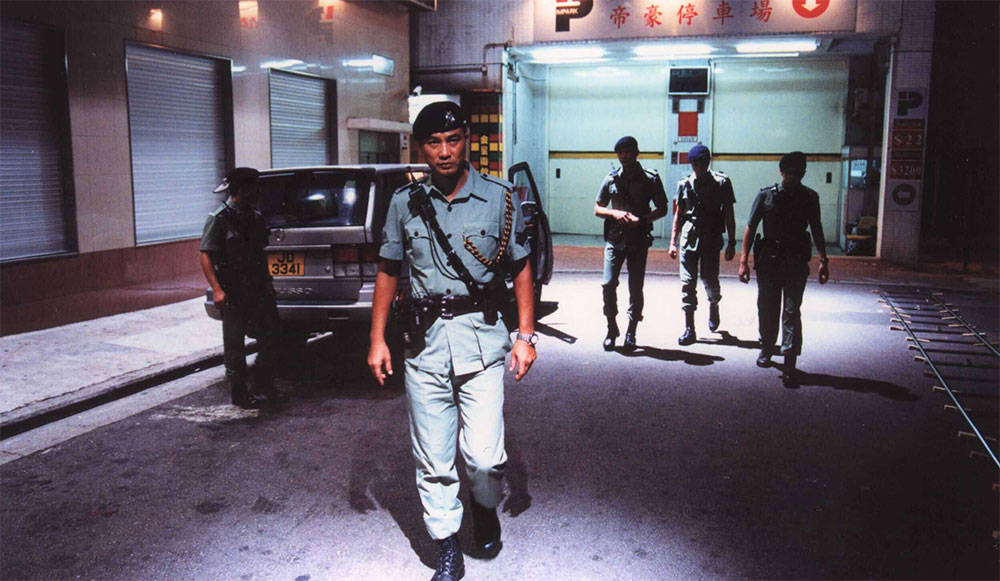The police procedural almost always aims to demarcate moral boundaries: cops and robbers; forces of the state and agents of anarchy; order and chaos. Even when violent measures take protagonists into unsettling gray zones, institutions that represent the law always end up triumphing. In Johnnie To’s cinema, this dualistic model of justice and exploitation is shattered. For the Hong Kong filmmaker, his native city is not balanced by forces of good and evil, but rather acts as a bloody site of perpetual political conflict. Mafiosos, street thugs, high-ranking detectives, and beat cops are all one and the same: rival factions vying for control over unstable grounds. This bleak vision of turn-of-the-century politics is no clearer than in To’s PTU (2003).
Taking place over the course of one night in the Tsim Sha Tsui district, a series of interconnected stories kick off after mob captain Ponytail (Chou Chi-shing) is stabbed and the slimy police sergeant Lo Sa (Lam Suet) slips on a banana peel, losing his service-issued pistol in the process. Fearing that he will miss out on an upcoming promotion opportunity, Lo Sa contacts Police Tactical Unit Sergeant Mike Ho (Simon Yam) to help him locate his sidearm. Along with his sycophantic patrol unit, Ho calmly struts through the grimy alleyways along Canton Road, violently harassing random suspects and delicately navigating a brewing power-struggle between feuding triad bosses Eye Ball (Eddy Ko) and Bald Head (Lo Hoi-pang).
Images of Hong Kong in the ‘90s and 00’s often feature the city’s skyline. Like in Andrew Lau and Alan Mak’s iconic Infernal Affairs trilogy (2002 - 2003), domineering structures of glass and steel—the glistening fangs of the financial sector—protrude out of the horizon day and night. The city of Hong Kong has rebranded; the colonial jewel of the British Empire has now evolved into a thriving outpost of global capitalism and power has shifted from imperial governors to a boardroom of multinational executives. Reflecting the economist Milton Friedman’s imagination of the territory as a perfect laissez-faire experiment—“an overcrowded land” that “had achieved a level of income one-third higher” than it’s old colonial master by 1996—these reproductions of the newly established SAR encapsulate a spirit of ceaseless post-industrial modernity. However, To looks under this superficial façade of innovation.
PTU’s portrait of the city is one totally consumed by a shroud of savage darkness. To regulars, familiar street signs, and storefronts that hang behind the blur of faceless crowds desperately squeezing past stand solitary amidst the humid midnight air. With memories of the ’97 financial crisis and the SARS-outbreak still fresh during this film’s release, depictions of an empty city feels all the more devastating as the promises of a new era are nowhere to be seen. In these vignettes that border on those of post-apocalyptic abandonment, the only players onstage, with the exception of a boy that rides around in his bicycle, are the gun-toting and knife-wielding nomads that populate this urban wasteland.
Ho and his squad of officers look less like neighborhood beat cops and more like roving paramilitary bandits with their jet-black trench coats, leather army boots, and berets. Flickering street lamps project their domineering silhouettes over the empty streets. Yam’s performance is one that is totally unnerving, rarely ever betraying any sign of fear or excitement, only ever letting out a wry smirk even while he senselessly beats one of his victims. Although To does make some efforts to humanize members of the police force, especially through the reluctant Sergeant Kat (Maggie Shiu) and a naïve rookie (Frank Liu), the system is undoubtedly rotten to its core. With the real life Police Tactical Unit’s own role as riot control specialists in Hong Kong, heavily involved in policing civil demonstrations, To’s film is totally disillusioned by the accountability of institutions and laments the complete powerlessness the masses feel in the wake of ceaseless politicking.
PTU screens this evening, October 10, at the Museum of Modern Art on 35mm as part of the series “Chaos and Order: The Way of Johnnie To.”



